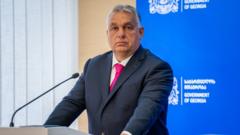Hungarian Prime Minister Viktor Orban's recent visit to Georgia has sparked significant controversy, especially following the nation's contentious election results. Speaking in Tbilisi, Orban congratulated Georgia's ruling party, which has been accused of authoritarianism, asserting the election was "free and democratic," a claim at odds with numerous reports indicating widespread electoral violations.
In a move that surprised many, Orban chose to ignore various allegations regarding serious electoral misconduct. Observers from the EU and U.S. have voiced their dissatisfaction with the electoral process, stating that it did not meet standards for fairness. The European Commission President, Ursula von der Leyen, emphasized the importance of investigating the irregularities quickly, transparently, and independently.
The outcome of the election has faced backlash from Georgia’s pro-Western president, Salome Zourabichvili, who described the event as influenced by a "Russian special operation." Opposition parties, asserting that the election was "stolen," have echoed similar sentiments, pointing towards systematic voter manipulation and intimidation.
During his visit, Orban articulated criticism of the EU's approach, claiming a double standard in the way electoral victories are acknowledged based on the political leanings of the winning party. "European politics has a manual. If liberals win, they say it’s democratic, but if conservatives win, there's no democracy," he stated, seemingly dismissing the concerns raised by observers.
Georgia's Prime Minister Irakli Kobakhidze defended the electoral process amid allegations of vote-buying, ballot-stuffing, and threats against voters. He insisted that the elections adhered to legal standards and dismissed claims that his government is leaning towards Russia.
In the lead-up to the election, observations made by Georgia's 'My Vote' monitoring group detailed numerous violations, stating that vulnerable voters were coerced into voting for the ruling party through financial incentives, while significant irregularities occurred on election day. Claims of "carousel voting," where individuals supposedly voted multiple times, have raised alarms about the integrity of the electoral process, prompting calls for the annulment of the results from specific polling stations.
Despite criticisms from his EU counterparts and evidence presented by monitoring organizations, Orban's administration maintained its support for Georgia's ruling party, highlighting a growing rift within the European Union regarding responses to governance issues in the region. As protests continue and calls for accountability escalate, the implications of this disputed electoral process could have lasting ramifications for Georgia's political landscape and its relationship with Europe.




















